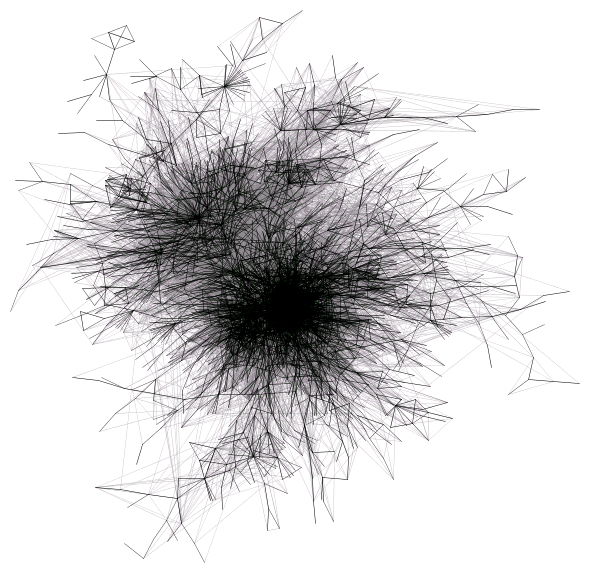|
Google == Internet?.
Now there's a study that ranks Google as the most valuable brand, not just in tech -- bigger than Coca-Cola, Marlboro, Wal-Mart, GE, and of course Microsoft and Apple. It's the #1 most valuable brand in the world. If you stopped the man or woman in the street and asked what Google means, what would they say? I don't know but I suspect they would say "The Internet." [Scripting News]2:50:14 PM |
|
Black hole found!. Here's Discovery's map of the blogosphere. Actually, it's one small Matthew Hurst of Nielsen Buzzmetrics. Here's his Data Mining blog, where most recently he pointed to a seminar titled How to Read 100 Million Blogs (and How to Classify Deaths without Physicians), where a series of links leads to a serious paper that says stuff like
We trust Matthew to understand this stuff. Or at least I do. Here are some way cool maps of the old 'sphere, including the one above. About that he says,
AH! There it is! Notice that there is still some air, some space, some gray, in the "technical discussions and gadgetry" zone, while the "socio-political discussion" has gone black in the middle? Huh? Okay. Now go back and read what I said here and here about "black hole" discussions. One sample:
Then also go back and read what I said here on the blog the "snowball effect":
... and look at what I said in a talk at OSCON last summer, starting here. (Keep clicking that almost-invisible link in the upper right. It says "next".) Note that the difference between a snowball and a black hole is not only that between light and dark, but that between progress and its opposite [~] or perhaps (to borrow from Virginia Postrel) dynamism and stasis. Both grow, but one goes somewhere and the other doesn't. I realize now that much of what I have come to know, understand and believe about blogging was gained by techblogging, and hanging with techies. Or at least people in tech fields. The practice of vetting half-backed and provisional ideas [~] scaffolding understanding, when that's the best we can do, so far [~] is ideally suited to tech projects and subjects, and getting progress going. Progress also happens in the socio-political zone of the 'sphere. I am constantly amazed at what is being done with politics. Amazing, constructive and good work. (The Personal Democracy Forum is a wonderful window into that work, as well as an instrument of it.) On some transient, highly charged topics, however... whoa. Politics and politicized topics often produce severe clustering. Sometimes those turn into black holes, meaning that trying to change minds from the outside is a losing proposition. Anyway, this is one of those provisional posts. My mind isn't made up here. I'm just looking at stuff I've been thinking out loud about the new light of Matthew Hurst's insights and visualizations. Now I need to pack for Brussels and London. See ya there. [The Doc Searls Weblog]2:28:26 PM |


